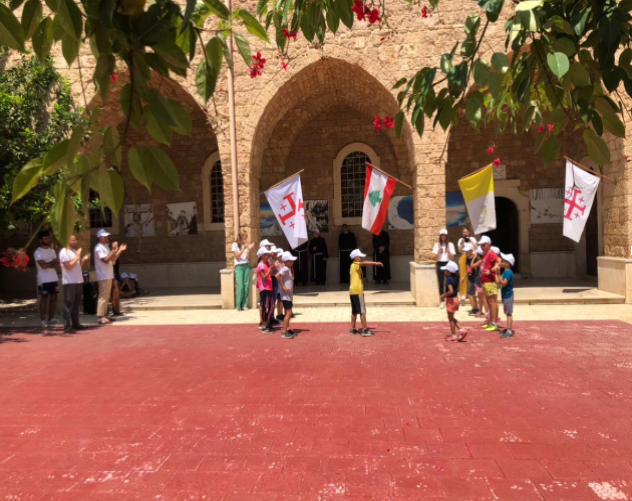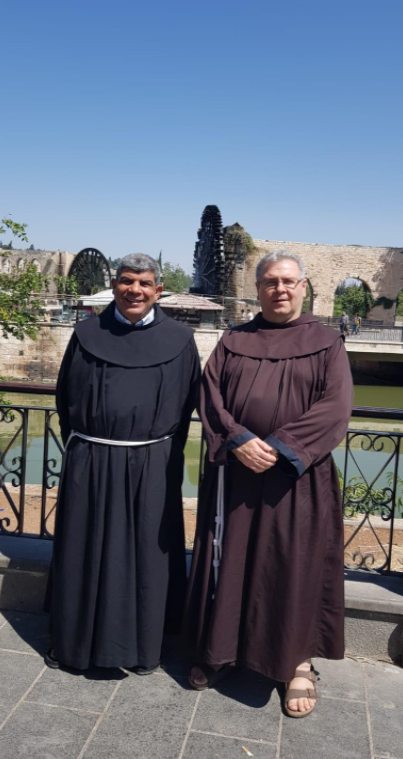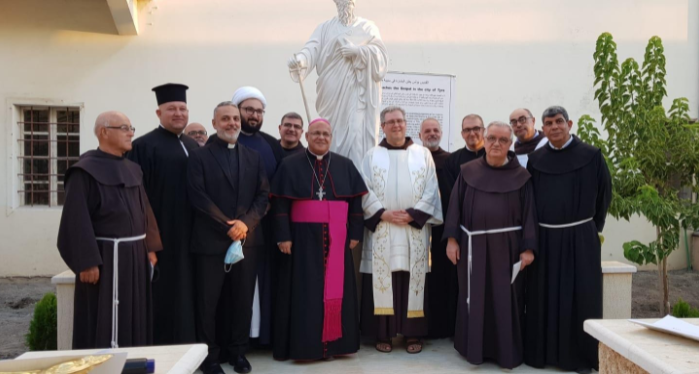
Father Ibrahim Faltas: "In the drama of Syria and Lebanon, we give children hope"
By Renato Burigana
Abuna Ibrahim Faltas, a Franciscan friar, was born in Alexandria, Egypt, in 1964 and was ordained a priest in 1992. He is a member of the Custody of the Holy Land. He currently lives in Jerusalem. He is director of schools of the Custody of the Holy Land, counselor of the Custody itself, director of Casa Nova in Jerusalem and member of the John Paul II Foundation of which he was one of the founders. He was assistant pastor in Bethlehem, pastor in Jerusalem and in charge of the Status Quo of the Basilica of the Nativity. Decisive was his mediation between Palestinians and Israelis during the siege of the Basilica of the Nativity in Bethlehem in 2002. A profound connoisseur of the Middle East, he has always been in the forefront of advocacy for peace and dialogue between peoples. Father Ibrahim was recently in Syria and Lebanon. Right to hear him on the situation in those two troubled countries.
- You have visited communities in Aleppo and those in Beirut. How did you find the two cities, the residents, and especially the children after more than a year and a half of Covid, economic crisis and destruction due to war?
"They were long and intense days, the ones I spent together with Father Custos Francis Patton during the trip to Syria and Lebanon, but the fatigue was largely rewarded by the joy of re-embracing our Franciscan friars, whom we had not seen for a long time, and who continued to keep alive their presence in our friaries in both Lebanon and Syria. Two neighboring countries, sharing the absurdity of destruction, of the erasure of human dignity. Syria with an endless war. A paid war, which has seen only destruction of entire villages, homes, which has forced millions of Syrians to find a future abroad. Lebanon, a country that until the 1980s had a thriving economy, but suffered the war of corruption and misguided economic policies, which brought the country to its knees, and the explosion at the port of Beirut in 2020, completely destroyed, socially and economically. In both Syria and Lebanon to pay the highest price are the children, because in this situation their childhood is deprived of the right that every child in the world should have: the right to have a home, a family, food, education, to play and to be helped in their growth with serenity and affection to enter the world. Our friars in Syria and Lebanon are doing a huge work, to try to reach every family and every child, to give them welcome and fraternity, helping everyone to a dignified life, to look at the future with new eyes and with a heart full of hope."
- The Franciscans of the Custody of the Holy Land have always stood by the people of the Middle East, for over 800 years. People love you and know how important you are for peace, development, assistance to the poorest. In Beirut you have one of the "historic" convents in the whole area. It suffered serious damage from the August 4, 2020 explosion, how is it now?
"The August 4 explosion at the port of Beirut was the culmination of an already disastrous situation economically. Our convent is located in the Gemmayze neighborhood, not far from the port, and suffered severe damage, as did all the surrounding stores and homes. More than eighty thousand families were left homeless. In our convent, the explosion collapsed part of the roof, seriously damaged many rooms and especially the facade, which was built in a very beautiful architectural style. Our whole community was severely shocked by the destruction, but the friars did not lose heart and have already completed all the reconstruction work, to make the convent and the premises usable as a reception center and reference point for many Lebanese who come. for help. Let us not forget that this was also possible thanks to the help of many benefactors who are sensitive to the mission that the Franciscans carry out in Lebanon."
- How have you found the situation in Beirut, which with its 450,000 inhabitants is the largest and most populous city in Lebanon? Is the cost of living now as out of control as inflation; the lack of electricity (there have been two total blackouts in a few days), the destruction of many homes and neighborhoods, and a government that does not seem to find a way out of this situation?
"In Beirut the situation is terrible. In the days I was there, together with Custos Father Francis Patton and the friars, we were without light several times. On a daily basis, people are forced to deal with various emergencies: light is rationed, water is distributed for only a few hours a day and every other day, gasoline and fuel are scarce and very expensive, there is a lack of medicine and milk for children. Everything is continually increasing and many families are bordering on destitution. Unemployment is so high that many Lebanese even go to Egypt to look for work. It is a paradox if we think that in the years of splendor it was Egyptians who aspired to go to work in Lebanon because it was a rich land. It is a crippled country that needs the help of the entire international community to help the people create a government that will think about the revitalization and rebirth of a country rich in a thousand historical resources and natural beauty. It is the only country in the entire Middle East where eighteen different denominations coexist, which is an enormous wealth."
- Lebanon, with its nearly seven million inhabitants, one million Iraqi refugees, two million Syrian refugees and more than half a million Palestinian refugees, is experiencing one of the most difficult times in its history. What can the European Community and Italy do?
"I believe that we should start again by putting order at the governmental level, creating a new era that listens to the needs of the population and that is projected towards the development of the new Lebanon, without forgetting the issue of Syrian, Iraqi and Palestinian refugees who make up fifty percent of the Lebanese population and live with "refugee" status. The country is in part to be rebuilt, with infrastructure that will also allow us to envision Lebanon as the center of a Middle East that is itself renewed and revitalized."
- The Land of the Cedars, which Pope St. John Paul II called a "message of peace," is one of the most beautiful countries in the entire Middle East: with the National Museum in Beirut, the Temple of Bacchus in Baalbek, the Beqa' valley from the cellars of fine wines, the Cedars of God forest, the shrine of St. Charbel and the shrine of Our Lady of Lebanon, to name just a few of the most fascinating places, it could make a living from tourism. How to help Europeans rediscover it? Can tourism be an economic avenue for its revival?
"Certainly the country has multiple aspects for which it lends itself to creating international tourism. Let's not forget that Lebanon is a pilgrimage destination. In the years before the Covid, there was a revival of organized parish groups, who went to Lebanon for the beauty of the land, for the spirituality of St. Charbel, a monk of the Lebanese Maronite order, called the 'Padre Pio' of Lebanon. To also learn about history and pray at the Shrine of Our Lady of Harissa, but also to discover how many different denominations coexist in this small country. Tourism, historically, has always been an important source of the country's economic resources. I believe that a communication campaign to make the country known should be reintroduced internationally."
- One last question: we are approaching Christmas, the feast of Jesus' birth. What is the situation of the little boys and girls, the smallest and most defenseless after these two terrible years?
"The situation is sad. In Syria many children are orphaned, many abandoned. In Lebanon, many children are experiencing the severe economic crisis that has affected many families. Unfortunately, this long period of Covid has somewhat closed attention to the needs of these countries, as well as others. But the human heart is always bigger than any event! With the help of benefactors we try to give children a happy childhood, even though they are often alone. We cannot replace everything they have been deprived of, but we can help them to hope for a better future and to dream that Christmas is approaching, and that the son of God is also born in a manger."



